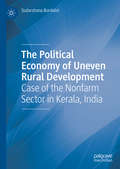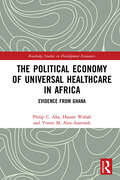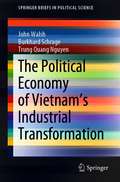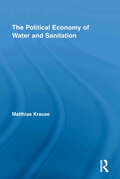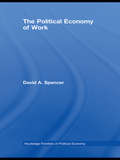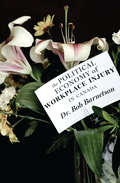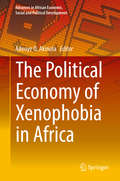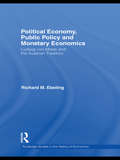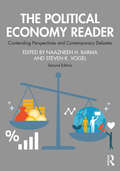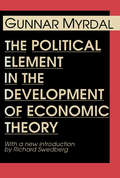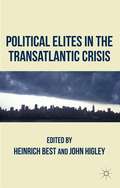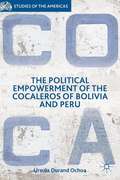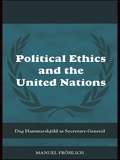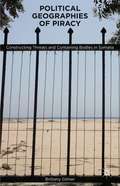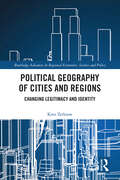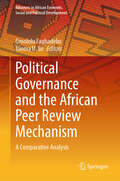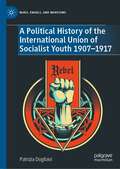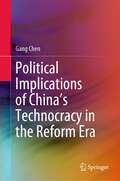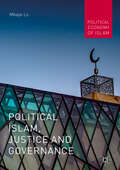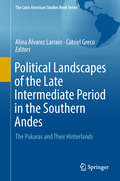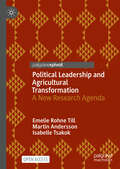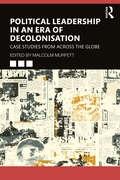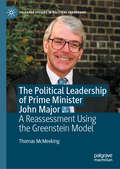- Table View
- List View
The Political Economy of Uneven Rural Development: Case of the Nonfarm Sector in Kerala, India
by Sudarshana BordoloiThe book shows how class relations develop and is a consequence of capitalist development of the rural non-agricultural/non-farm sector (RNFS)---seen as the dialectical relation between the forces and relations of production---as mediated by the state, which produces uneven social and spatial outcomes. Central to the framework for this book are four inter-related conceptual building blocks or themes: social relations of production, productive forces, role of the state and concrete development outcomes of capitalist production in RNFS in the context of class and non-class relations of oppressions. These four conceptual themes follow a logical sequence where each concept evolve in specific contexts within the RNFS; while connected to each other in a dialectical manner; and come together to form the central argument of the book.
The Political Economy of Universal Healthcare in Africa: Evidence from Ghana (Routledge Studies in Development Economics)
by Philip C. Aka Hassan Wahab Yvette M. Alex-AssensohThe global rise in pandemics, most recently COVID-19, and other health challenges, some of which are due to climate change, have imposed significant challenges on the healthcare systems in economies around the world. Thus, this book deals with an issue that is very timely and relevant, not just in Africa but globally. It critically assesses healthcare reforms in Ghana under the Fourth Republic, since 1993. Although it focuses on Ghana’s National Health Insurance Scheme of 2003, the book instructively goes beyond this program. The book argues that, although Ghana is a bellwether of healthcare reforms in Africa, its healthcare initiatives are still far from the service haven of healthcare as a human right. Themes that animate the book’s argument include the need to translate human rights law, such as the right to health, into practical policies that work for ordinary citizens. Key highlights of the book include an increased accent on health as a human right, emphasis on comparative analysis in healthcare studies, and the formulation of a four-hallmark framework, embedded in economics, law, politics, and human rights, to act as a guide for assessment of healthcare reforms in Africa in particular, and Ghana more specifically. Using Ghana as a case study and analytical window into the world, the book offers a valuable and timely resource for academics, students and policymakers across the disciplines of development and healthcare economics, law, public policy, political science, sociology, and African and Caribbean studies, as well as in various fields in health science.
The Political Economy of Vietnam’s Industrial Transformation (SpringerBriefs in Political Science)
by John Walsh Burkhard Schrage Trung Quang NguyenThis book presents an overview of political economic change in Vietnam during a period of significant social and economic change and an era of international turbulence. It combines various political economic perspectives to offer an integrated and comprehensive review of Vietnam’s recent development, discussing topics such as public administrative reform, labour markets and special economic zones, environmental management and other important contemporary issues. This concise and highly readable book includes a considerable amount of research, and as such provides valuable insights for scholars and researchers interested in political economic change and in Vietnam.
The Political Economy of Water and Sanitation (Routledge Studies in Development and Society #Vol. 20)
by Matthias KrauseAccording to recent estimates, around 6,000 people – mostly children under five – die every day from diseases caused by inappropriate water and sanitation (WS) services. Much of the academic and political debate surrounding this issue has focused on private sector participation. By shifting the attention towards the influence of governance, Krause examines the political and sectoral institutions that are essential for the provision of WS services. Utilizing data from sixty-nine developing countries, Matthias Krause demonstrates that the level of democracy has a statistically significant positive impact on access to WS services and that low-quality governance of sub-national governments compromises the internal efficiency of providers and the widespread access to services. This book makes a critical contribution to the water and sanitation research and will help academics and policy-makers to rethink the way in which they deal with water issues.
The Political Economy of Work (Routledge Frontiers of Political Economy)
by David SpencerAgainst the background of increasing interest in the changing nature and quality of work, The Political Economy of Work offers a new and unique assessment of the theoretical analysis of work. The author challenges some common preconceptions about work and promotes an original approach to the field, contemplating the nature and development of ideas on work and its impact on human well-being drawing on such burgeoning literatures as the 'economics of happiness'. Spencer approaches the subject through a careful examination of the history of thought on work over the last three hundred years. A key focus is the development of ideas on work in mainstream economics, starting with the mercantilists and the classical economists, and continuing with neoclassical economists (e.g. Jevons, Marshall). The contributions of modern approaches including the new 'information-theoretic' economics and the new 'economics of happiness' are also discussed. The author sees flaws in the depiction of work in mainstream economics and instead draws insight from the writings of critics of the mainstream paradigm, such as the nineteenth century 'utopian' writers (Godwin, Fourier, Carlyle, Ruskin, Morris), Marx, and the old institutional economists (Commons, Veblen). The alternative approach outlined in the book stresses the barriers to rewarding work under capitalism and develops a case for radical change in the organisation of work. The book cuts across different disciplinary boundaries and is likely to appeal to researchers in a number of different fields, including labour economics, labour history, the sociology of work, industrial relations, and human resource management. It will appeal to all those who wish to promote a more critical understanding of the role that work can and ought to play in society.
Political Economy of Workplace Injury in Canada
by Bob BarnetsonWorkplace injuries are common, avoidable, and unacceptable. The Political Economy of Workplace Injury in Canada reveals how employers and governments engage in ineffective injury prevention efforts, intervening only when necessary to maintain the standard legitimacy. Dr. Bob Barnetson sheds light on this faulty system, highlighting the way in which employers create dangerous work environments yet pour billions of dollars into compensation and treatment. Examining this dynamic clarifies the way in which production costs are passed on to workers in the form of workplace injuries.
The Political Economy of Xenophobia in Africa
by Adeoye O. AkinolaThis book analyzes the phenomenon of xenophobia across African countries. With its roots in colonialism, which coercively created modern states through border delineation and the artificial merging and dividing of communities, xenophobia continues to be a barrier to post-colonial sustainable peace and security and socio-economic and political development in Africa. This volume critically assesses how xenophobia has impacted the three elements of political economy: state, economy and society. Beginning with historical and theoretical analysis to put xenophobia in context, the book moves on to country-specific case studies discussing the nature of xenophobia in Nigeria, South Africa, Zambia, Ghana and Zimbabwe. The chapters furthermore explore both violent and non-violent manifestations of xenophobia, and analyze how state responses to xenophobia affects African states, economies, and societies, especially in those cases where xenophobia has widespread institutional support. Providing a theoretical understanding of xenophobia and proffering sustainable solutions to the proliferation of xenophobia in the continent, this book is of use to researchers and students interested in political science, African politics, peace studies, security, and development economics, as well as policy-makers working to eradicate xenophobia in Africa.
Political Economy, Public Policy and Monetary Economics: Ludwig von Mises and the Austrian Tradition (Routledge Studies In The History Of Economics Ser.)
by Richard M EbelingAustrian economist, Ludwig von Mises, was one of the most original and controversial economists of the 20th century, both as a defender of free-market liberalism and a leading opponent of socialism and the interventionist-welfare state. He was both the grant designer of a political economy of freedom and a trenchant, detailed critic of government regulatory and monetary policies in the first half of the 20th century. This fascinating book explores the cultural currents of anti-Semitism in Austria before and after the First World War that Mises confronted as an Austrian Jew; his analysis of Austria-Hungary’s establishment of a gold standard; Mises’ multi-sided activities in the years after the World War I in stemming a hyperinflation, opposing government fiscal mismanagement, and resisting misguided policies during the Great Depression; and his analysis of how Europe plunged into World War II and the policies to restore freedom and prosperity in the post-war period. It also discusses the confrontation between the Austrian Economists and the Keynesians over the causes and cures for the Great Depression, as well as how Mises’ "Austrian" approach to money and the business cycle contrasted with both the ideas of Joseph A. Schumpeter and the Swedish Economists of the interwar period. This volume breaks new ground in placing Ludwig von Mises’ many original views on political economy, public policy and monetary economics in the historical context of his time, especially during the interwar period when he was a senior economic analyst for the Vienna Chamber of Commerce and after his arrival in America during World War II. The book will therefore be of interest to students and researchers in monetary economics, political economy, expectations theory and the market process, and the history of economic thought.
The Political Economy Reader: Contending Perspectives and Contemporary Debates
by Naazneen H. BarmaThe Political Economy Reader advocates a particular approach to the study of political economy – the "market-institutional" perspective – which emphasizes the ways in which markets are embedded in political and social institutions. This perspective offers a compelling alternative to the market-liberal view, which advocates freer markets and less government intervention in the economy, as if states and markets were naturally at odds with each other. The reader embraces a truly interdisciplinary approach to the study of political economy, with extensive coverage from sociology, economics, history and political science. It includes some of the most important classical and contemporary theoretical perspectives on political economy. And it engages some of the most topical debates in political economy today, such as climate change, the global financial crisis, inequality, the digital platform economy, and the COVID-19 pandemic. For political economy courses at a variety of levels and from a range of disciplines, the reader is also of interest to scholars and citizens wanting perspective on the intersection of economics, politics, and society. New to the Second Edition • More than 20 new readings included by such notables as Elinor Ostrom, E. J. Hobsbawm, Dani Rodrik, Amartya Sen, Thomas Piketty, and Mariana Mazzucato among many others. • Fully updated introductions to the book and each thematic chapter of readings. • Coverage of key emerging debates including climate change, the financial crisis, inequality, the digital platform economy, and COVID-19
The Political Element in the Development of Economic Theory: A Collection Of Essays On Methodology (International Library Of Sociology Ser.)
by Gunnar MyrdalMyrdal described this book as a discussion of three key notions in economic theory: the ideas of value, freedom, and collective house-keeping. It is through these concepts, he charged, that political ideology has been intro-duced into economic theory. This volume continues to be relevant in its emphasis on the problem of objectivity in the social sciences.
Political Elites in the Transatlantic Crisis
by Heinrich Best John HigleyThe United States and most European countries have experienced an economic-political crisis unmatched in severity since the Great Depression. The crisis discredits the thesis of a nexus between free markets, unending economic growth and liberal democracy. It is obvious that elites principal decision-makers in powerful public and private organizations at national and supranational levels have been pivotal actors in this crisis. It has without doubt been the hour of elites. What do elites' responses to the crisis reveal? How are elites altered by it? In whose interests have they acted? Although the authority of elites is always subject to dispute, has the crisis damaged it irreparably? What do decisive actions by non-elected elites and leaders in the Federal Reserve, European Central Bank, European Commission and other institutions mean for democracy? In analyses covering five years of crisis, from 2008 to mid-2013, leading scholars in the field address these questions in order to understand the role of elites in the transatlantic crisis. "
The Political Empowerment of the Cocaleros of Bolivia and Peru
by Ursula Durand OchoaThis book offers a comparative analysis of the distinct experiences of the Peruvian and Bolivian cocaleros as political actors. In doing so, it illustrates how coca, an internationally criminalzsed good, affected the path and outcome of cocalero political empowerment in each case.
Political Ethics and The United Nations: Dag Hammarskjöld as Secretary-General (Cass Series On Peacekeeping Ser.)
by Manuel FroehlichBased on a wealth of sources, files and interviews, and including previously unpublished material, this book explores the foundations of the political ethics of Dag Hammarskj�ld, the second Secretary-General of the United Nations, examining how they influenced his actions in several key crisis situations. Hammarskj�lds political innovations, such
Political Geographies of Piracy
by Brittany GilmerPolitical Geographies of Piracy examines the new security-development framework for combating piracy off the coast of Somalia. It demonstrates how counter piracy actors, particularly in the development sector, are reworking territorial sovereignties and reproducing markets of security and development in Somalia. Underlying onshore counter piracy strategies is a desire to both simultaneously secure and develop Somalia. However, the wider goal of these security-development strategies is to prevent and contain particular racialized and gendered actions and bodies on shore in Somalia. Drawing upon unique insider knowledge of the international counter piracy regime, Gilmer reveals the institutional machinations at stake in efforts to simultaneously combat and profit from Somali piracy. Research conducted on the ground in Somalia, and with convicted piracy prisoners detained in the Seychelles, also provides a rare glimpse into how security-development strategies for combating piracy are being promoted and resisted among various Somali communities.
Political Geography of Cities and Regions: Changing Legitimacy and Identity (Routledge Advances in Regional Economics, Science and Policy)
by Kees TerlouwThis monograph presents a novel typology of relational and territorial perspectives on legitimacy and identity. This typology is then applied to two different political and historical contexts, namely the trajectories of the Amsterdam metropolitan region in the Netherlands and the Ruhr metropolitan region in Germany. The historical discussion spans 500 years, providing valuable depth to the study. Taken as a whole, the book provides a new perspective within the territorial-relational dichotomy and the geographies of discontent debate. Its key insights are that identity and political legitimacy is embedded in history, and that both relational and territorial perspectives on these issues are time and place dependent. This book will be stimulating reading for advanced students, researchers and policymakers working in political geography, human geography, regional studies, and broader social and political sciences.
The Political Geography of Inequality
by Pablo BeramendiThis book is a study of the politics of redistribution and inequality in political unions. It addresses two questions: why some political systems have more centralized systems of interpersonal redistribution than others, and why some political unions make larger efforts to equalize resources among their constituent units than others. This book presents a new theory of the origin of fiscal structures in systems with several levels of government. The argument points to two major factors to account for the variation in redistribution: the interplay between economic geography and political representation on the one hand, and the scope of interregional economic externalities on the other. To test the empirical implications derived from the argument, the book relies on in-depth studies of the choice of fiscal structures in unions as diverse as the European Union, Canada, and the United States in the aftermath of the Great Depression; Germany before and after Reunification; and Spain after the transition to democracy.
Political Governance and the African Peer Review Mechanism: A Comparative Analysis (Advances in African Economic, Social and Political Development)
by Omololu Fagbadebo Isioma U. IleThis book presents a comparative analysis of political governance and includes case studies from various African countries. It further sheds light on the paradox of poverty despite Africa's plentiful resources and traces its roots in historical legacies of colonialism and leadership failures. The book examines the African Peer Review Mechanism (APRM) initiated by the African Union (AU) in 2003 and explores the APRM's role in promoting sustainable development, political stability, and integration. Against this background, the book dissects the four thematic areas of the APRM, with a focal point on democratic and political governance, illuminating challenges and proposing solutions. In case studies on selected African countries, contributors present governance structures, highlighting the struggle for accountability, representation, and public participation. The book highlights alarming indicators of weak governance, including corruption and declining public engagement, and reflects Africa's journey toward effective governance. By doing so, the book scrutinizes African governing systems' responses to crises and offers valuable insights into the continent's quest for progress and transformation.
A Political History of the International Union of Socialist Youth 1907–1917 (Marx, Engels, and Marxisms)
by Patrizia DoglianiThis book represents a valuable contribution to the history of the Socialist Second International and, more generally, of European socialism between the Great Depression of the 1880s and WWI. It comes to fill a gap in the scholarship, insofar as it investigates the history of the Socialist Youth International. During the first phase of the making of socialist parties, this organization was in charge of the political and cultural education of the proletarian youth. Capitalizing on an approach based on social, quantitative and political history, and on an analysis of mentalities and languages, the book reconstructs the many-sidedness of the “school of recruits” of the social-democratic and revolutionary movements. The working conditions of youth in Europe, its unionization and economic struggles, the fight against militarism, the pedagogical work, the internationalism and the commitment to maintain peace, and the attitude of young militants towards Bolshevik revolution are some of the themes investigated in the book. It also clarifies the role and the engagement with the issue of the new generation shown by prominent figures of Marxism such as Karl Liebknecht, Jean Jaurès, Henri De Man, Willi Münzenberg, Henriette Roland Holst, and Robert Danneberg. Finally, the book constitutes also a page of European social and political history, reconstructed through the history of the various youth socialisms and their relationship with the Marxist tradition.
Political Implications of China's Technocracy in the Reform Era
by Gang ChenThis book focuses on the evolution of technocracy in contemporary Chinese politics and its implications in China’s elite politics and policymaking. The rise of technocracy in contemporary Chinese politics is not only attributed to the meritocratic tradition based on civil service exams in ancient China but also tied to the current authoritarian political system that relies on the top-down cadre promotion approach instead of public elections. Leaders with technocratic backgrounds have brought changes to China’s political landscape since technocrats tend to solve governance issues using technical solutions in an industrialized society as compared to pure politicians and revolutionaries, who are inclined to resort to political, and sometimes populist, options. This book examines the specific tech areas from which top technocrats have been emerging in Chinese politics, which include military and aerospace industry, public health, engineering and science, economics and finance, as well as information technology. It is a unique research monograph based on research on China’s evolving technocracy and its political, economic and international implications that provides a detailed and thorough study of the country’s industrial policies being reshaped by these technocrats and their likelihood of joining the Chinese Communist Party’s top echelon in the next five to ten years.
The Political Influence of Business in the European Union (New Comparative Politics)
by Andreas Dür David Marshall Patrick BernhagenMany citizens, politicians, and political activists voice concern about the political influence of business in the European Union. But do business interests really pull the strings in Brussels? Contrary to expectations, this book shows that business interests are no more influential than other interests in shaping contemporary EU policies. Andreas Dür, David Marshall, and Patrick Bernhagen present an original argument that stresses the role of public actors in facilitating or impeding interest groups’ lobbying success. Novel data on a large number of legislative proposals on the EU’s agenda and three case studies present strong support for this argument. The Political Influence of Business in the European Union offers new insights into how lobbying success depends on the demand and supply of information, as well as new ideas on how to measure lobbying success. The book advances a fresh perspective on the question of business power and shows why business interests often lose in the policy struggle.
Political Islam, Justice and Governance (Political Economy of Islam)
by Mbaye LoThis book argues that political Islam (represented by its moderate and militant forms) has failed to govern effectively or successfully due to its inability to reconcile its discursive understanding of Islam, centered on literal justice, with the dominant neo-liberal value of freedom. Consequently, Islamists' polities have largely been abject, often tragic failures in providing a viable collective life and sound governance. This argument is developed theoretically and supported through a set of case studies represented by the Muslim Brotherhood in Egypt (under President Muhammad Morsi’s tenure), Hassan Turabi's National Islamic Front in Sudan and The Islamic State in Iraq and Syria (ISIS). It is ideal for audiences interested in Regional Politics, Islamic Studies and Middle Eastern Studies.
Political Landscapes of the Late Intermediate Period in the Southern Andes: The Pukaras And Their Hinterlands (The Latin American Studies Book Series)
by Alina Álvarez Larrain Catriel GrecoThis book studies the relationship between pukaras and their surrounding landscape, focusing on the architectural and settlement variability registered in both contexts. It is the outcome of a symposium held at the XIX National Congress of Argentine Archaeology (San Miguel de Tucuman, August 8–12, 2016) entitled, "Pukaras, strategic settlements and dispersed settlements: Political landscapes of the Late Intermediate Period in the Southern Andes." Based on the topics discussed at the event, this book presents nine case studies covering a large geographic area within the Southern Andes (northwestern Argentina, northern Chile and southern Bolivia), and breaking the national barriers that tend to atomize pre-Hispanic landscapes.The respective chapters cover a wide range of themes: from architectural and settlement variability, ways to build and inhabit space, social segmentation and hierarchy; to endemic conflict, analysis of accessibility and visibility, spatiality and temporality of landscapes; as well as new dating. This book goes beyond the Late Intermediate Period (LIP) analyses from the perspective of fortified settlements and material evidence related to war, by placing the focus on how ancient political landscapes were constructed from the relation between the pukaras and other sites as part of the same territory.The methodologies used include pedestrian surveys, photogrammetric surveys with UAVs (unmanned aerial vehicles) or drones, topographic and architectural surveys, excavations of households, ceramic and rock art analysis, and spatial analysis with geographic information systems (GISs). Given the numerous thematic interconnections between the contributions, the Editors have organized the chapters geographically, moving from south to north: from the southern valleys of Catamarca Province in Argentina to Lipez in the southern part of the Bolivian Altiplano, passing through the Calchaqui valleys of Catamarca, the puna and Quebrada de Humahuaca of Jujuy in northwest Argentina and the Antofagasta region in northern Chile.The book provides valuable new theoretical and methodological perspectives on the study of political landscapes of the Late Intermediate Period in the Southern Andes .
Political Leadership and Agricultural Transformation: A New Research Agenda
by Martin Andersson Isabelle Tsakok Emelie Rohne TillThis open access book examines the impact of political leadership on agricultural transformation to understand why cases of successful agricultural transformation are so rare in the developing world. It highlights the importance of leadership and its interaction with the socio-political system as a key factor impacting agricultural transformation. The book takes a first step in systematically exploring commonalities in the role played by the political leadership in successful and less successful agricultural transformations, drawing from an analysis of Taiwan, Ethiopia, the Philippines, and Malawi. This book provides a deeper understanding of leadership dynamics, facilitating the work of unlocking new pathways to, and generating new policy options for, sustainable and impactful agricultural change. It will be relevant to students, researchers, and policymakers interested in agricultural economics, the political economy, and development economics.
Political Leadership in an Era of Decolonisation: Case Studies from Across the Globe
by Malcolm MurfettWhat is leadership, and why is it so important? In what ways does it look very different in different contexts, and in what ways does it look the same? Malcolm Murfett brings together a range of emerging and established scholars to examine these questions in light of some of the mid-twentieth century’s most intriguing national leaders. In a series of striking biographical chapters, lessons are drawn from the apartheid era in South Africa, Lee’s remarkable socio-economic transformation of Singapore, Castro’s revolutionary overhauling of Cuba, and the playing out of Bandaranaike’s populist agenda in Sri Lanka. The book illuminates what Brezhnev and Nixon were looking for in the Cold War and what happened when the people turned against Nyerere in Tanzania, the Shah in Iran, and Ceauşescu in Romania. These case studies address what leadership meant for the individuals whose record in power is being examined. These are not idealised portraits of ‘how to do leadership’ but warts-and-all portrayals of exceptional individuals who scrabbled their way to the top and stayed there for several years during a period of great change. Business schools have long studied the theoretical axioms of corporate leadership. What this book does, however, is to move beyond the theory into the practical realm of politics and statecraft. This is a fascinating book on leadership that will be of interest for students, researchers, and practitioners studying leadership in business and politics, as well as for students of global history, decolonisation, and the Cold War.
The Political Leadership of Prime Minister John Major: A Reassessment Using the Greenstein Model (Palgrave Studies in Political Leadership)
by Thomas McMeekingThis book seeks to re-examine John Major’s leadership using techniques developed through Presidential Studies: namely using Fred Greenstein’s seminal study of Presidential Leadership, The Presidential Difference, and its six criteria for leadership (public communicator, organisational capacity, political skill, public policy vision, cognitive style, and, finally, emotional intelligence). It is through Greenstein’s model that a fresh look can be taken at not only Major’s time in office, but equally the man himself, which proves to be just as revealing. Major’s tenure has often been characterised as being weak and incompetent, as he presided over a sleaze-ridden and divided party on the issue of Europe. With almost a quarter of a century having passed since Major left office, it looks to be an appropriate moment to re-assess his premiership and important role in the recent seismic events surrounding the 2016 Brexit referendum and its outcome.
